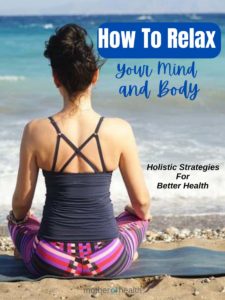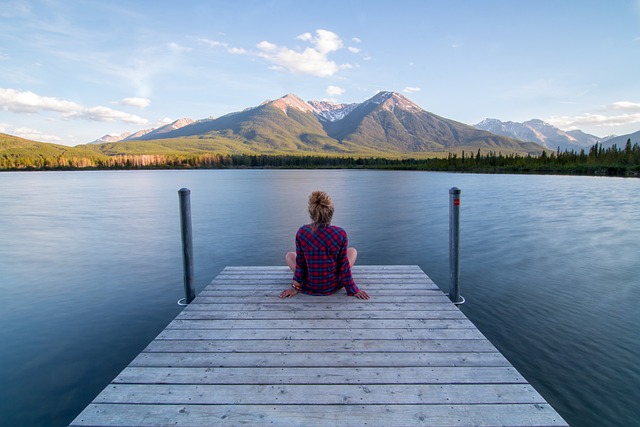Did you know that you need to know how to relax your mind and body to be healthy? You may think relaxing is a luxury or something or experience on vacation, but it's vital to your health and wellbeing and should be part of everyday life.
Stress, if not treated properly, can lead to bigger health concerns. Unfortunately, chronic stress is a problem for a lot of us.
What is Relaxation?
Relaxation is a state of being free from tension or worries. It should help you decompress your mind, body, and spirit, and allow your mind to ease from worries and your body ease from stress.
In this blog post, we will discuss some tips on how to improve your mental health with relaxation strategies.
Why Can I Not Relax My Body?

Do you remember learning stress management in school?
No, me either.
It seems like something we should have been taught, but sadly it was never part of the curriculum.
There are many reasons why people cannot relax their minds and bodies. Here are a few common excuses:
- You are over-committed and don't have time
- It's not culturally acceptable
- Your brain does not know how
- You picked the wrong relaxation method
What Are the Health Benefits of Relaxation?
Relaxing is a lot like eating and exercising, it's good for you!
Here's how relaxing contributes to your health:
Relaxing Lowers Blood Pressure
High blood pressure often has no symptoms and can lead to heart attack and stroke.
Hypertension is a leading cause of death and diet and exercise can influence it, but so can relaxation.
In the same way, 30 minutes of physical activity can lower your risk of high hypertension, so can 30 minutes of many relaxation methods. Because relaxation methods work.
Relaxing Boosts Blood Flow
Spending time in relaxation helps blood flow to the brain and other major organs. Stress management helps our systems work as they were designed. Restricted blood flow and muscle tension can cause illness and injuries.
Relaxation Improved Digestion
Relaxation is voluntary and helps us calm ourselves and our bodies. It can improve digestion by loosening muscles and allowing for proper blood flow to the digestive system.
Ayurveda teaches that the key to health is good digestion. Every cell in your body has been created by a transformation from food. If you are digesting food well, the result is healthy cells and body tissue. If your digestion is impaired you are more susceptible to disease.
You Are the Biggest Barrier to More Relaxation

Relaxation is a voluntary action that often makes it harder to achieve. Choosing to relax requires awareness, discipline, and self-love.
The good news is, that you can reduce anxiety with some simple mindset shifts. You can remove the barriers, including yourself, from the equation.
Choose Relaxation Through Awareness
Our sympathetic nervous system or SNS helps us in times of stress.
When we are feeling stressed and our SNS is activated, we experience an increased heart rate and boosted adrenaline. Our fight or flight response kicks in.
By contrast, our parasympathetic nervous system or PNS helps our bodies transition from fight or flight to keep us calm and connected.
Understanding that the SNS needs to shut down and PNS needs activation is important, otherwise we live in a heightened state of vigilance all the time. This can lead to trouble falling asleep, chronic worry, and anxiety.
Get out of your own way by recognizing when your SNS needs a break. Living with too many stressors can keep your body in fight or flight and it's up to you to determine when you need to trigger your PNS and find peace.
Choose Relaxation With Discipline
It takes discipline and practice to make relaxation a routine part of your everyday life.
In the same way you create other health routines, you can shift your mind to include relaxation. Find a way to relax that makes sense for you and your lifestyle and stick to it. It's okay to try more than one activity until you land on the ones that work best to reduce the stress for you.
Schedule Relaxation Into Your Day
Practice mindful meditation, breathing exercises, a cat nap, or walking barefoot in the grass on your to-do list. For most people, marketing it down on their schedule can help them make relaxation a priority until it feels like a normal part of life.
Choose Relaxation Out of Self-Love
There are lots of ways to feel peaceful.
Deep breathing and alternate nostril breathing can help you achieve a relaxed state, but so can a yoga class or a self-massage. Relaxation should be a reflection of the love you have for yourself and your health.
Joining relaxation with activities that bring you peace, joy, and comfort is a form of self-care that benefits your mind and body as a whole.
Get out of your own way by allowing yourself to do things that feel lovely and loving. Find relaxation by soaking in a warm bath or enjoying moon milk or your favorite warm drink.
Relax your body alone or in the company of others. Learn to embrace relaxing physical activities as vital as eating and sleeping are for your health. Don't allow anyone else to encroach on your health decision to find more time to relax.
How Do You Find the Right Relaxation Techniques for You?

Acknowledging the importance of relaxation is an important first step to a healthier and more rested you.
But how do you plan to achieve some peace when relaxing hasn't been your go-to health move?
Thankfully, there is a wide range of ways to relax.
Since you are unique, what you consider relaxing may vary from someone else. That's why it's important to try different techniques until you land on a handful that does the trick.
What Are Your Top Stressors?
If you are a white-collar worker, your stress may include traffic, deadlines, dealing with difficult people, etc.,
A primary caregiver may face stress dealing with children, overwhelming amounts of laundry, and endless sticky countertops.
If you work with your hands, your stress may include sore muscles, long hours, and fatigue. Whatever you do, there's specific stress involved.
Determining what your top stressors are can help you identify what type of relaxation is the most beneficial for you.
You may intuitively know ways you'd like to relax and unwind, or you may need to explore options until you land on the ones that work best.
How To Relax Your Mind and Body – Standard Relaxation Techniques
- Meditation and mindful meditation
- Walking meditation
- Breath exercises
- Progressive Muscle Relaxation Therapy
- Yoga, Tai Chi, Qi Gong
- Aromatherapies
- Listening to music
- Massage
- Reading and Reflecting
- Positive psychology and affirmations
- Walking, hiking
You may enjoy all, some, or none of these ideas or you may have something else entirely that helps you relax.
Basic Beginner Yoga Program
More Stress Relief Ideas

Aromatherapy
Essential oils turn on the natural healing power of your sense of smell. Essential oils taken from plant material communicate with your brain and nervous system. Specific aromas create specific health benefits. Valeria and lavender are two essential oils used for stress relief.
Drink Herbal Tea
Tea has been used for centuries for its medicinal benefits. Two of my favorite herbal teas for stress relief are chamomile and Lemon Balm. If you are a gardener, you can grow both of these plants in your backyard and make them directly from the flowers.
Take Herbs
Herbs can heal. Before Rockafeller medicine, nature was used as medicine. Herbalists prescribe Ashwagandha, Holy Basil, and Lemon Balm for stress relief.
Unplug From Technology
It may seem relaxing to scroll through social media, but it can trigger anxiety and stress responses. It's become habitual to look at a screen anytime there's nothing else holding your attention. Social media is NOT helpful to relieve tension.
Rather than default to screen time, try sitting in silence or listening to soothing music instead. Unplugging from technology close to bedtime can make a big impact on how fast you fall asleep and how deeply you rest.
Ayurveda
Ayurveda is the traditional and natural healing practice founded in India more than 3000 years ago. It recognizes your body, mind, and spirit as all interconnected, and moves to balance your energy flow. Ayurveda can be used to treat stress and anxiety.
Reiki
The ancient healing system of Reiki is often used for stress reduction and operates on the same life force energy premise as acupressure and acupuncture.
Reiki is based on the principle that a Reiki therapist can use his or her own personal energy field to help someone else. This happens via touch, or hovering hands just above the patient's body to channel healing energy into that person's body. It is a natural, holistic, drug-free healing process.
Choose Better Foods and Eat More Often
Managing blood sugar can help you stay relaxed. Suffering the highs and lows of being hangry one moment and experiencing a food coma the next is stressful to your mind and body.
Instead, plan to eat often and choose high-quality food combinations. This helps keep your mood and energy stable.
Learning how to relax the mind and body does not have to be relegated to one long session.
It's possible to snag some relaxation throughout the day which adds up to a more refreshed and relaxed state of being. Find the techniques and opportunities for relaxation that best fit your schedule and your lifestyle and stick to them for a healthier mind and body.
Practice Muscle Relaxation
A simple exercise you can do to relax your physical body, which in turn will help quieten your mind, is what is known as progressive muscle relaxation. The process involves tensing and relaxing body parts. You can start at your toes and work your way up the different body parts, one by one, by clenching and then releasing the muscles.
Progressive Muscle Relaxation Instruction
Step 1 – Lie down on a flat surface that's comfortable on your back. Close your eyes. Inhale and exhale deep breaths repeatedly. Then, take in another deep breath while keeping your teeth clenched. Exhale slowly, then relax your facial muscles.
Step 2 – Do another inhalation, then hold your breath. You must feel the tension in your chest, upper back, and neck.
Step 3 – Take a deep breath. Form your hands into fists. Apply pressure on your arms until it feels tense. Exhale.
Step 4 – Inhale. Feel the pressure on your bottom and pelvic floor. Tighten your abdomen. Then exhale to release the pressure.
Step 5 – Take the next inhalation. Curl your toes as you do this. Try to activate all the muscles in your legs. Exhale.
Step 6 – Lastly, take five long breaths. Let your mind and body take the rest and rejuvenation it deserves.
Practice Guided Imagery
Also referred to as visualization or guided imagery, this type of deep relaxation meditation involves the senses. With the help of a guide or a teacher, you are instructed to form relaxing images of places, people, and situations in your mind to bring about inner transformations.
Guided imagery takes you through an entire story that's intent is to take the mind to a place of serenity. Here's a relaxation session I've used for years because it's so effective at melting away stress and anxiety.
Practice Yoga Nidra
Yoga Nidra loosely translated means “yogic sleep”. It is one of the deepest forms of relaxation somewhere between being awake and falling asleep. Except in actual sleep, you lose track of yourself. Yet, in Yoga Nidra, you remain conscious of the outer world with just a trace of awareness while you experience deep rest. You can learn Yoga Nidra here.
Conclusion
Despite our best efforts to relax your mind and body, there are roadblocks that get in the way. But, no matter what the roadblock is, there is always something you can do about it. Relaxation isn't something that would be nice to experience more of, it's a necessity that will help you live a longer, healthier life.
Whether or not your doctor suggests some untraditional approach for treating your stress, there are many nonstandard practices that complement modern medicine for stress relief.



